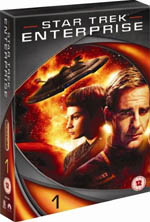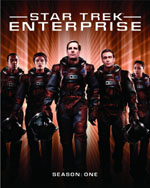11: Cold Front
It seems bizarre that "Enterprise" waited this long to give audiences the next chapter
in its primary long term story arc. I'd say it was at least 3 episodes too late if it wanted to
keep audiences on the hook, and that's just to give the series a bit of room to pursue all
those Trekkian "firsts". Without those, "Cold Front" should have come no later than this
show's 4th broadcast.
This story starts well in terms of re-triggering our interest in all the intrigue afoot,
and continues with some nice surprise twists and revelations, as well as having an effective,
unusually ominous closing shot. It also does a better job than
"Broken Bow" in focusing
on this plot and making the regulars aware of it.
But we're not really getting a lot of useful information. A new character named Daniels
is introduced to us, who gives us a huge info-dump. As predicted, the opposing futuristic
factions are concerned about this past's abilities to "change" their present, indicating that
these characters, and probably the Trek writers as well, have their heads in the sand regarding
branching timelines and alternate universes, making much ado about nothing. Daniels' holographic
graphics are cool though, and artificially make the stakes seem larger by adding some atmosphere.
We also have the return of our lead Suliban villain, now given the name of Sillick
or Selleck (no relation to Tom) or something. He manages to cast doubt on Daniels' info dump
with a dump of his own and some ambiguous actions. Which of these two opposing parties
is worthy of Archer's sympathies? Which is trying to change this "history", and which is
trying to preserve the way it would "unfold naturally"? This episode raises the questions,
but then leaves it all hanging so we can dive back into the mess for another chapter later on.
From my point of view, this identical question was all done better in a fifth season
TNG episode called
"A Matter of Time", scripted by executive producer
Rick Berman no less. Or for that matter, one can look at the season three Deep Space Nine episode
"Destiny" which featured a great final solution
for a similar dilemma.
If, like Archer and crew, your present moment is right at the crucial decision point,
do you really need to fuss over the ramblings of untrustworthy manipulators who
claim to have information from the future? What would your actions be if you simply followed
your best principles and behaved as you would have without any future knowledge?
Thus, there's really no need to choose between Daniels and Sillick. Too bad Archer wasn't
able to just throw them both in the brig (separate cells would be best),
and carry on.
Indeed, though each member of Archer's crew gets at least a token scene in this
story, the show's long term plot really doesn't seem to INVOLVE them very deeply.
They're just unimportant pawns here with little of impact to do, while the guest
characters are the real players. None of this is REALLY working well as a long term
plot that the main Enterprise characters can sink their teeth into.
And so the episode's fortunes are like a double-edged sword. We tune in
for the plot, but then tune out for the lack of character investment to be found
in that plot.
And when the next broadcast after this one turned out to be a re-run,
it was the point where I tuned out of Enterprise's first season. The characters
were just not coming alive, the long-term plot was advancing too slowly,
and the episodes on average had been the dullest of any incarnation of Trek. Not until
the season finale approached the following spring did I give Enterprise another chance,
catching "Detained", "Two Days and Two Nights", and "Shockwave"....
Read the next Star Trek In-depth Analysis Review:
"Shockwave"
|
|








 slimline
slimline U.S.
U.S. Canada
Canada U.K.
U.K.
